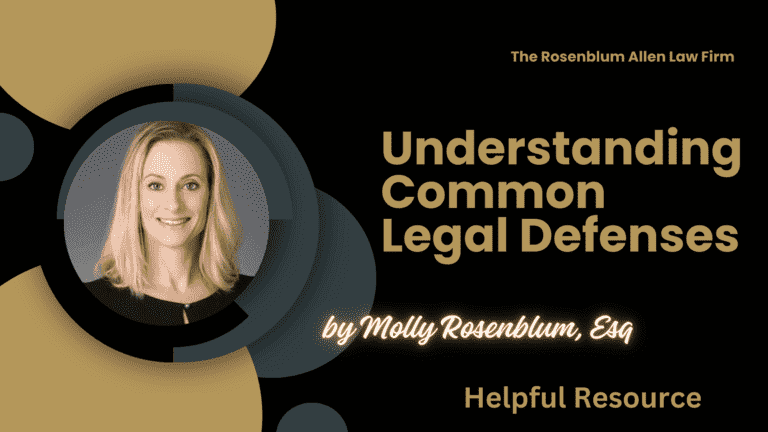A Simple Guide to How Defense Attorneys in Las Vegas Protect Your Rights
In the city of Las Vegas and throughout the state of Nevada, defense attorneys play a vital role. They help people who are accused of crimes to defend their rights. But how do they do it? Let’s break down some common legal defenses used in Nevada.
Note: Make sure to also check out our Legal Defense Myths in Nevada post while you’re here.

The Alibi Defense
The word “alibi” is Latin for “somewhere else.” If someone is accused of a crime, one way to defend against the accusation is to prove they were somewhere else when the crime happened. This is called an “alibi defense”.
For example, if you were having dinner with friends during the crime, your friends could testify in court to prove your alibi.
The Self-Defense Claim
In some cases, a person might have used force to protect themselves. If they are charged with a violent crime like assault, they can argue that they were acting in self-defense.
This means they had a reason to believe they were in danger and used only as much force as necessary to protect themselves.
The Insanity Defense
The insanity defense is rare, but it does happen. This defense means that the accused person was not in the right mind when the crime occurred. They didn’t understand what they were doing was wrong. This complex defense needs a lot of proof, like medical and psychiatric records.
The Consent Defense
Sometimes, a person might be accused of theft or trespassing, but they had the other person’s permission. In this case, they can claim consent as a defense. They need to prove that the alleged victim had permitted them.

The Constitutional Rights Defense
Every person in America has rights under the U.S. Constitution. If the police or court does something that violates these rights, it can be used as a defense.
For example, if the police searched a person’s home without a warrant or proper consent, any evidence found may not be used in court.
The Entrapment Defense
Entrapment happens when law enforcement officers persuade someone to commit a crime they would not typically commit. If an officer pushes a person into committing a crime, they may be able to use the entrapment defense.
However, this defense can be tricky because it can’t be used if the person was ready to commit the crime and the police just gave them the opportunity.
The Mistake of Law Defense
Sometimes, a person might not know what they did was against the law. Sometimes, they can argue a “mistake of law” defense. However, this defense isn’t used often because ignorance of the law is usually not considered a good excuse.

The Necessity Defense
The necessity defense is used when a person commits a crime to prevent more significant harm.
For example, if someone breaks into a building to save a person from a fire, they might use the necessity defense to argue that they had no other choice.
The Mistake of Fact Defense
A “mistake of fact” defense is used when a person misunderstands some facts that led to their illegal action.
For instance, if someone took someone else’s bag thinking it was their own, they might use this defense.
The Intoxication Defense
In some cases, a person might argue that they were too intoxicated to understand their actions. This defense is not often successful, mainly if the person chooses to get drunk. However, it might be used if a person was drugged without their knowledge.
The Duress Defense
Duress is a situation where a person commits a crime because they are forced or threatened by someone else. In such cases, the duress defense can be used.
For instance, if a person was threatened with severe harm or death unless they committed a crime, they could use this defense.

The Double Jeopardy Defense
Double Jeopardy is a term that means being tried twice for the same crime. The U.S. Constitution protects people from this situation.
So, if a person has been acquitted (found not guilty) of a crime, they can use the double jeopardy defense if someone tries to put them on trial for the same crime again.
The Statute of Limitations Defense
Most crimes have a “statute of limitations,” which means there is a specific time limit to bring charges against someone. If this time limit passes, a person can use the statute of limitations as a defense.
For example, if a person is accused of a theft that happened ten years ago, they might be able to use this defense, depending on the laws of Nevada.
The Infancy Defense
In Nevada, children under a certain age are considered incapable of committing a crime. This is known as the infancy defense. The age limit varies, but it’s generally used for children under 14.
The Automatism Defense
Automatism is when people act without knowing what they’re doing, like sleepwalking. If a person commits a crime during an episode of automatism, they might be able to use this defense. It’s a rare defense and requires a lot of proof.

The Coercion Defense
Similar to duress, coercion involves a person being forced into committing a crime, but it usually involves psychological pressure rather than physical threat. If someone is manipulated or coerced into committing a crime, they may use coercion as a defense.
The Abandonment/Withdrawal Defense
This defense can be used when a person initially planned to be part of a crime but decided to pull out before the crime was committed. They must have not only abandoned the plan but also tried to prevent the crime from happening.
The Involuntary Intoxication Defense
While voluntary intoxication is rarely successful as a defense, involuntary intoxication is different. If someone was drugged without their knowledge and committed a crime as a result, they might use the automatic intoxication defense.
The Impossibility Defense
This defense is used when a person is accused of attempting a crime that was impossible to carry out. There are two types: factual impossibility (the crime could not possibly have been committed) and legal impossibility (the action was not indeed a crime).
The Provocation Defense
In some cases, a person may be provoked into committing a crime. This defense doesn’t excuse the crime but may reduce the severity of the charges. It’s often used in cases involving crimes of passion, where a highly emotional event provoked the person.

The Honest Mistake Defense
Sometimes, an individual may commit a crime based on a genuine, honest mistake. This defense is used when a person has a good faith belief that their actions were legal.
For example, if a person bought stolen goods without knowing they were stolen, they might use the honest mistake defense.
The Defense of Property
The defense of property is used when a person commits a crime to protect their property. This could be used if someone is charged with assault after they were trying to prevent a burglar from robbing their home.
The Defense of Others
Like self-defense, the defense of others is used when a person commits a crime to protect someone from imminent harm.
For example, if a person comes to the aid of someone being attacked and injures the attacker, they could use this defense.

The Act of God Defense
This defense is used when a person commits a crime due to uncontrollable, natural forces, such as a hurricane or earthquake. This defense is very rare and used only in extreme circumstances.
The Sovereign Immunity Defense
Sovereign immunity is a legal doctrine that protects the government from being sued without consent. This defense is usually used by government employees accused of crimes committed during their jobs.
The Accident Defense
Sovereign immunity is a legal doctrine that protects the government from being sued without consent. This defense is usually used by government employees accused of crimes committed during their jobs.
Why You Have Not Hired a Felony Defense Attorney Yet
Watch this short video to take the next big step toward defending your rights against a felony charge.

Breaking It All Down for You
Nevada’s legal defenses can be complex, ranging from entrapment and mistake of law to defenses like coercion, double jeopardy, and necessity. Each defense is unique and requires a skilled attorney to employ it in a court of law effectively.

Frequently Asked Questions
What is the role of a defense attorney in a criminal case?
A defense attorney’s primary role is to protect the rights of the accused, present evidence to support their client’s defense, cross-examine prosecution witnesses, and guide their client through the legal process.
What does "presumed innocent until proven guilty" mean?
This principle means that the burden of proof lies with the prosecution. The defendant doesn’t have to prove their innocence; instead, it’s the prosecution’s responsibility to verify the defendant’s guilt.
What is the difference between the mistake of law and the mistake of fact defenses?
A mistake of law defense is used when a defendant is unaware that their action was illegal. A mistake of fact defense is used when a defendant misunderstands or is mistaken about some facts that led to the alleged crime.
Can ignorance of the law be used as a defense?
Generally, ignorance of the law is not an acceptable defense. However, it may be used in rare circumstances if a person is genuinely unaware of a specific law or regulation.
What does the double jeopardy defense mean?
Double jeopardy is a principle that protects individuals from being tried twice for the same crime. If a person has been acquitted of a crime, they can’t be tried again for the same offense.
Are there defenses that children in Nevada can use?
The infancy defense is used for children under a certain age, generally under 14 years old. It’s based on the premise that children of a certain age cannot commit a crime.
What is coercion in the context of legal defenses?
Coercion involves a person being psychologically pressured into committing a crime. If someone is manipulated or coerced into committing a crime, they may use coercion as a defense.
Can natural disasters be used as a defense in a criminal case?
Yes, the Act of God defense is used when a person commits a crime due to uncontrollable, natural forces, such as a hurricane or earthquake. It’s a rare defense used only in extreme circumstances.
Can a person use a defense if they commit a crime to protect themselves or others?
Yes, the self-defense, defense of others, and defense of property justifications can be used if a person commits a crime to protect themselves, someone else, or their property from harm.

Additional Resources for You
Our readers should be aware that our lead attorney, Molly Rosenblum Allen, Esq., has not only provided excellent legal representation but has also created a wealth of resources to assist you in understanding various legal concepts and situations. Here’s a list of insightful resources you may find helpful:
Double Jeopardy: Understanding your rights and the legal intricacies related to being tried for the same crime twice. Read more
Hung Jury: Find out what happens when a jury cannot agree on a verdict and how it affects your case. Read more
Circumstantial Evidence: Learn how indirect evidence can be used in court and how it might impact your case. Read more
Indicted vs Charged: Understand the difference between being indicted and being charged, and the legal process involved in each. Read more
Difference Between Jail and Prison: Get informed about the distinctions between these two types of incarceration. Read more
What are Miranda Rights: Learn about your rights when being questioned by law enforcement and the significance of the Miranda Warning. Read more
How to Check if You Have an Outstanding Warrant: Discover the steps you need to take to find out if there’s an outstanding warrant against you. Read more
What to Look for in a Criminal Defense Lawyer: Gain insights into the key qualities and expertise you should seek when choosing legal representation. Read more
Possible Ways to Reduce a Felony Charge: Explore potential strategies that may be employed to lessen the severity of a felony charge. Read more
Should You Accept a Plea Bargain: Understand the implications of plea bargaining and get guidance on whether it’s a suitable option for your case. Read more
Molly Rosenblum Allen, Esq., is dedicated to providing not just legal representation but also education and resources to help you navigate through complex legal situations. Feel free to explore these resources and gain the knowledge you need in your time of need.

Offsite Resources You May Find Helpful
Here are seven offsite resources that may be of interest to you. They all offer valuable information related to legal matters, particularly those relevant to criminal defense:
American Bar Association: Provides a wealth of resources on various areas of law, including criminal law, family law, and more.
FindLaw: Offers a broad range of legal information, including articles on criminal charges and defenses.
National Association of Criminal Defense Lawyers: Offers resources for criminal defense lawyers and those interested in criminal law.
Legal Information Institute – Cornell Law School: Provides a comprehensive legal encyclopedia and a range of legal resources.
Justia: Offers free case law, codes, regulations, and legal information for lawyers, business, students, and consumers worldwide.
National Legal Aid & Defender Association (NLADA): NLADA champions effective legal assistance for people who cannot afford legal counsel.
The Innocence Project: Works to exonerate the wrongly convicted through DNA testing and reforms the criminal justice system to prevent future injustice.
Remember, these resources are for informational purposes and are not a substitute for professional legal advice. Always consult a qualified attorney for legal counsel.

A Special Message From Our Lead Attorney

Molly Rosenblum, Esq
Dear Reader,
I’m Molly Rosenblum, Esq., and I want to thank you personally for reading through our “Understanding Common Legal Defenses” resources. These materials were designed to help you gain a basic understanding of various legal charges and defenses. But remember, nothing replaces the advice and guidance of a skilled attorney when navigating the legal landscape.
If you or a loved one are facing legal charges, know you have rights and options. Please reach out to our team for a free consultation. We’re here to listen to your story, answer your questions, and discuss potential legal strategies that might apply to your situation.
Don’t hesitate to call us at (702) 433-2889. We understand the gravity of your situation and are here to support you every step of the way.
Thank you again for your time, and I look forward to assisting you in your legal journey.
Best regards,
Molly Rosenblum, Esq.




